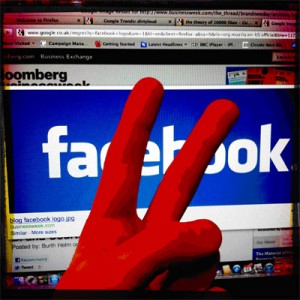* This is a guest blog by DJ, music producer and digital advertiser Tim Healey who tweets at @timhealey and whose official Facebook page is here
 It came to a head on holiday about a year ago. I was confronted by my wife. I had been having an affair. A casual relationship and furtive interaction had become something sinister and all-consuming. She was right, time needed to be called. It was her and our girls… or Facebook.
It came to a head on holiday about a year ago. I was confronted by my wife. I had been having an affair. A casual relationship and furtive interaction had become something sinister and all-consuming. She was right, time needed to be called. It was her and our girls… or Facebook.
She had busted me in beautiful Tegernsee, Germany, as I stood atop a sun-drenched snow-covered mountain. Instead of thinking “This is jaw-droppingly beautiful” or “Let’s make a snowman with the children”, my only thoughts were: “My Facebook fans will love this view of the valley and will generate loads of comments”.
It had started so innocently. As a DJ/Producer and label manager I began using the social network as a platform to promote myself. In my head, I believed that more interaction with fans would lead to more likes on Facebook; more likes on Facebook would lead to more profile and bookings around the world, and also (surely?) more sales when I released my next track.
I soon worked out that fans preferred personal comment such as interesting/beautiful photos and experiences rather than self-promotion. A picture of a (finished) large bottle of pear schnapps and a “it took us two hours to get through this” comment received more responses than “buy my new single/watch this video – it’s out today”. An image of a stunning tropical beach was received better than any new tour dates I would be announcing.
And that was where the rot set in. I began to see my life through the lens of a Facebook user. Moments such as a beautiful dawn were no longer mine, they were to be photographed and uploaded to Facebook to be shared with my fans.
Blatantly promoting myself soon took second place to a more subtle approach of engaging posts. Anything I saw or heard needed to be immediately thrown up onto the web, to start a conversation, in what became an increasingly time-consuming mission to keep people interested in me.
My new passion did not stop with Facebook: I was told by a “social network guru” that in order to increase my reach on Twitter I should check out those who follow me, and if they have 1,000 followers or more, I should strike up a conversation with them.
Soon I had embarked on a further relationship. At home with my family, a message on Twitter would appear on my iPhone, and I would entertain continuing a conversation with @Katerinaclubgirl, Sao Paulo (948 followers) because she had RTed my message.
Did my intense affair with Facebook result in more sales and bookings? As is so often the case with social networks, this was almost impossible to quantify. Sure, I continued to sell music and secure gigs but when ranking yourself alongside other artists you face the stratospheric media might of top-selling artists such as Lady Gaga. She leads the world with a mind-boggling 47 million likes and (unless you are Rihanna, or have a series of Number 1 albums up your sleeve) this is all but unassailable.
Back on earth, the Brazilian band I manage, Dirtyloud, purveyors of (IMHO) the finest electro-house and dubstep, have 115,000 likes, which after a two-year career is considered in the electronic music scene to be impressive. So this volume of Likes appears to suggest that there is a tangible global interest in them and their music, which is confirmed as I fill their diary for 2012 with global dates.
Then there are those artists who value the reach of Facebook, and in order to compete with the stars, spend thousands a month on advertising through the network to reap thousands of Likes.
But to what end? What if (as often happens) Facebook or Google analytics reveal most of your fans are in a territory where you have never played, or where people usually download music illegally?
In the music industry, Facebook Likes have become a currency, by which people and products are valued, but with no real exchange rate. You can earn and buy Likes but you cannot trade them.
We now live in an i-experience economy, where the personal experiences of people and DJs/musicians (from revolutions to rock concerts) are filmed on an iPhone and posted on the web. This trend only looks set to only become more intense in 2012. But for me, the affair is over. I shall have to continue to use Facebook to promote the work I do, but I am (so) over it.
From now on, I will own my experience, and not use it as a tool to increase my online value. There is every possibility, nay inevitability, that Facebook will go the way of MySpace.
All that time, money and effort invested in generating online value – gone in a puff of smoke – like a seedy little fling. But at the very least I can appreciated the beauty of a valley and can start making snowmen with my children.





